The song
Like Born a Woman, which was also written by Martha Sharp, Single Girl contained some sentiments that were ostensibly skeptical of men (for example, "I know all about men and their lies"). But whereas Born a Woman was seen by some as having feminist overtones, Single Girl was essentially more traditional in outlook—a young, isolated woman anticipating that "some day", despite not knowing anybody, people being "phoney" and the nights getting "so lonely", she would find waiting for her a man to "lean on". As one later commentator put it, drawing a contrast with Julie Rogers' The Wedding (1964), "Single Girl... touched a nerve with every 'wallflower' who possessed a record player". [2]
The score of Single Girl was notable for its gradual crescendo towards the end and a piano backing that, between the closing lines,
- Someday I’ll have a sweet loving man to lean on
- The single girl needs a sweet loving man to lean on,
contained two distinctive high notes that were apt to linger in the mind of the listener. Billboard described Single Girl as "a strong piece of ballad material with driving rhythm background". [3] The production overall conveyed very well the sense that "to make it in pop music in the 1960s, a girl needed a really strong song and a strong production, as well as a lot of tenacity and dogged determination". [4]

"Come Undone" is a song by English rock band Duran Duran, released in March 1993 by Parlophone and Capitol as the second single from their seventh studio album, Duran Duran (1993). With their commercial and critical success reestablished by the previous single "Ordinary World", "Come Undone" continued to showcase more of the band's entry into the adult contemporary radio format.

"No Rain" is a song by American rock band Blind Melon. It was released in 1993 as the second single from the band's debut album Blind Melon. The song is well known for its accompanying music video, which features the "Bee Girl" character. The music video, directed by Samuel Bayer, received heavy airplay on MTV at the time of its release. It subsequently helped propel Blind Melon to a multi-platinum level.

Martha Elaine Wash is an American singer-songwriter, actress, and producer. Known for her distinctive and powerful voice, Wash first achieved fame as half of the Two Tons O' Fun, along with Izora Armstead, as they sang backing vocals for the disco singer Sylvester including on his signature hit "You Make Me Feel ". After gaining their own record deal, they released three consecutive commercially successful songs which all peaked at number two in the dance charts. The duo was renamed The Weather Girls in 1982 after they released the top-selling single "It's Raining Men", which brought them to mainstream pop attention. The Weather Girls released five albums and were heavily featured on Sylvester's albums.

"Northern Star" is a song by British singer-songwriter Melanie C. It is the title track from her debut solo album and was released as the album's second single on 22 November 1999. It was written by Melanie C and Rick Nowels. The song was produced by Marius De Vries and received positive reception from music critics. The single charted at number four on the UK Singles Chart, becoming her third top-five single. It additionally reached the top 20 in Finland, Italy, and Sweden. In the United Kingdom, the single sold 216,000 copies as of June 2017.

"When a Man Loves a Woman" is a song written by Calvin Lewis and Andrew Wright and first recorded by Percy Sledge in 1966 at Norala Sound Studio in Sheffield, Alabama. It made number one on both the Billboard Hot 100 and R&B singles charts. Country singer John Wesley Ryles had a minor hit with his version of the song in 1976. Singer and actress Bette Midler recorded the song and had a Top 40 hit with her version in 1980. In 1991, Michael Bolton recorded the song and his version peaked at number one on both the Billboard Hot 100 chart and the Billboard Adult Contemporary Singles chart.
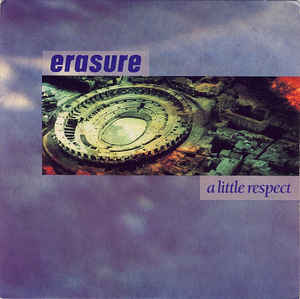
"A Little Respect" is a song written and recorded by British synth-pop duo Erasure, released in September 1988 by Mute. It was written by Vince Clarke and Andy Bell. The lyrics are a plea to a lover to show compassion and respect. The heavily synthesized instrumentation is accentuated by acoustic guitar and Bell's vocal falsetto in the chorus. It was their tenth single and was taken from their third studio album, The Innocents (1988). Known as one of their signature songs, the single reached number four on the UK Singles Chart and was Erasure's second consecutive top-20 hit on the US Billboard Hot 100, where it made number 14, and reached number two on the US Billboard Dance Club Play chart.
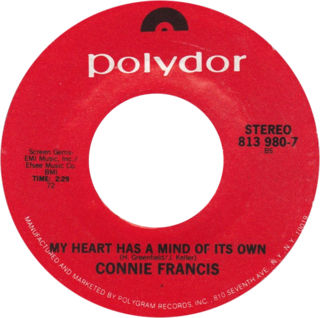
"My Heart Has a Mind of Its Own" is a song written by Howard Greenfield and Jack Keller which was a No. 1 hit for Connie Francis in 1960.
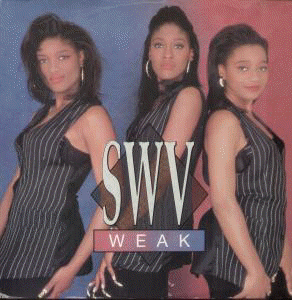
"Weak" is a song by American R&B vocal trio SWV from their debut studio album, It's About Time (1992). It was written and produced by Brian Alexander Morgan, who composed the lyrics based on a young person falling in love for the first time. Inspired by his crush on singer Chanté Moore, Morgan originally wrote the song for Charlie Wilson, but he later decided to give the song to SWV. Morgan later revealed that lead singer of SWV, Coko, did not like the song and gave him attitude during the recording of the single.
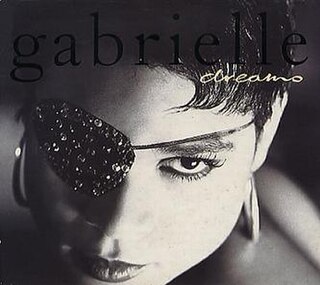
"Dreams" is a song by British singer and songwriter Gabrielle. It was written by Gabrielle and Tim Laws and produced by Richie Fermie for her debut studio album, Find Your Way (1993). Released by Go! Beat and London Records as Gabrielle's debut single, "Dreams" entered the UK Singles Chart at number two, which was the highest chart entry a debut act had obtained in the United Kingdom at that time before reaching number one for three weeks in June 1993. In the United States, the song peaked at numbers 26 and 27 on the Billboard Hot 100 and Cash Box Top 100, becoming Gabrielle's highest-charting song there. The song's music video was directed by Kate Garner.
"Tragedy" is a song by Gerald H. Nelson and Fred B. Burch.

Sandy Posey is an American popular singer who enjoyed success in the 1960s with singles such as her 1966 recording of Martha Sharp's compositions "Born a Woman" and "Single Girl". She is often described as a country singer, although, like Skeeter Davis, her output has varied. Later in her career, the term "countrypolitan", associated with the "Nashville sound", was sometimes applied. Posey had four hit singles in the United States, three of which peaked at number 12 on the Hot 100.

Martha Wash is the debut solo studio album by American singer and songwriter Martha Wash. It was released on February 23, 1993, through RCA Records. Recording sessions for the album took place in 1992 at several studios, after leaving her then-group The Weather Girls. The tracks in the album are a mixture of uptempo songs and ballads, which are basically inspired by R&B and house genres; it also features elements of soul and pop music. The album produced two US Billboard Dance chart number-one singles: "Carry On" and "Give It to You", and a top-ten single "Runaround".
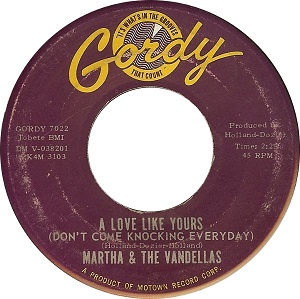
"A Love Like Yours (Don't Come Knocking Everyday)" is a 1963 song issued as the B-side to Motown singing group Martha and the Vandellas' hit single, "Heat Wave", released on the Gordy label.
Top of the Pops is the name of a series of records issued by Pickwick Records on their Hallmark label, which contain anonymous cover versions of recent and current hit singles. The recordings were intended to replicate the sound of the original hits as closely as possible. The albums were recorded by a studio group comprising session musicians and singers who remained uncredited, although they included Tina Charles and Elton John before they became famous in their own right.

"Give Me One Reason" is a song written and performed by American singer-songwriter Tracy Chapman. It was included on her fourth studio album, New Beginning (1995), and was released as a single in various territories between November 1995 and March 1997, her first since 1992's "Dreaming on a World". The song is Chapman's biggest US hit, reaching number three on the Billboard Hot 100. It is also her biggest hit in Australia, where it reached number three as well, and it topped the charts of Canada and Iceland. Elsewhere, the song reached number 16 in New Zealand, but it underperformed in the United Kingdom, peaking at number 95 in March 1997.
"Born a Woman" is a song by American pop singer Sandy Posey, produced by Chips Moman in Nashville on March 15, 1966. This reached No.12 on the Billboard Hot 100 in August 1966. It sold over one million copies and was awarded a gold disc.
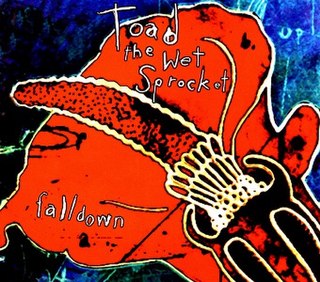
"Fall Down" is a song by alternative rock band Toad the Wet Sprocket from their fourth studio album, Dulcinea (1994). "Fall Down" was co-written by Glen Phillips and Todd Nichols. Released to US radio in April 1994, the song topped the Billboard Modern Rock Tracks chart and peaked at number 33 on the Billboard Hot 100. In Canada, the song peaked at number 10 and ended 1994 as the country's 76th-most-successful single. The music video for the song was directed by Samuel Bayer. In 2017, Consequence magazine ranked the song number 245 on their list of "Every Alternative Rock No. 1 Hit from Worst to Best".

"Jealous Again" is the debut single of American band the Black Crowes, released as the lead single from their 1990 debut album, Shake Your Money Maker. The song reached number 75 on the US Billboard Hot 100 and number five on the Billboard Album Rock Tracks charts. It also charted in Australia, Canada, the Netherlands, and the United Kingdom throughout 1990 and 1991.

"Birmingham" is a song by Canadian pop-rock singer Amanda Marshall. It was released in 1996 as the second single from her self-titled debut album. The song is her most successful single in Canada, reaching number three on the RPM 100 Hit Tracks chart, and it became her only song to appear on the US Billboard Hot 100, peaking at number 43.

"Tell It to the Moon" is a song by American singer-songwriter Martha Davis, which was released in 1988 as the second single from her debut solo studio album Policy. The song was written by Diane Warren and produced by Richie Zito. "Tell It to the Moon" failed to chart in the US, but peaked at number 65 on the Australian Music Report chart.

















